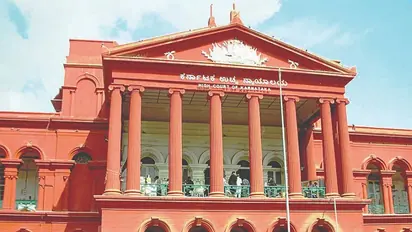Karnataka HC criticizes subsidy misuse, says 'make people work and eat'

Synopsis
The Karnataka High Court criticized the misuse of government subsidy schemes, emphasizing the need for self-sufficiency. In a case involving illegal sale of subsidized kerosene, the court imposed a fine of Rs. 25,000 on the accused, urging stricter measures to prevent such offences.
The Karnataka High Court expressed strong concerns about the misuse of government subsidy schemes, which are meant to aid the poor. Justice V. Sreeshananda, who was handling a criminal review petition, emphasized that while the government introduces welfare schemes with good intentions, their misuse is becoming a growing issue.
The case involved Syed Ghaus Khan (62) from Mysore, who had filed a petition to quash a lower court's order that found him guilty of illegally selling subsidized blue kerosene oil meant for Below Poverty Line (BPL) cardholders. In 2009, Khan, along with his accomplice Adil Khan, attempted to sell two barrels of blue kerosene oil to private buyers, diverting it from the government’s distribution system. The oil, which was supposed to be distributed to the poor, was instead filled into a diesel tanker and seized by the police at Mission Hospital on MH Road, Mysore.
Karnataka HC orders: No action against vehicles without HSRP until further direction
The Mandi police acted on a tip-off, arresting the two men and recovering a total of 130 litres of blue kerosene oil from their possession. The trial court in Mysore sentenced both men to five months in prison, along with a fine of Rs. 1,000 each. The decision was upheld by the 4th Additional District and Sessions Court. However, the accused moved the High Court in 2019, seeking to overturn the sentence.
During the hearing, Justice Sreeshananda expressed deep concern over the impact of subsidy schemes. He said, "It is painful to think about the state the country has reached today. It's not enough for the government to formulate subsidy schemes for the poor; their misuse should also be stopped." He also warned that if the accused were allowed to go unpunished, it would send the wrong message, leading to more such offences.
Renukaswamy murder case: Why was actor Darshan and gang granted bail? Key details revealed
Initially, the High Court was not inclined to show leniency, as this case fell under the Public Necessities Act, which deals with the illegal sale of essential goods. However, considering the age of the accused, the judges softened their stance. They pointed out that the prison system, especially for older individuals, should focus on reform, and it would not be beneficial for Khan and his co-accused to suffer in jail at this stage of their lives. As a result, they decided to modify the sentence and instead imposed a fine of Rs. 25,000 each on the accused, with a deadline to pay by January 10, 2025. Failure to do so would result in serving the original prison sentence.
This case sheds light on the growing problem of misuse of welfare schemes and the need for better implementation and monitoring of government aid.
Stay updated with the Breaking News Today and Latest News from across India and around the world. Get real-time updates, in-depth analysis, and comprehensive coverage of India News, World News, Indian Defence News, Kerala News, and Karnataka News. From politics to current affairs, follow every major story as it unfolds. Download the Asianet News Official App from the Android Play Store and iPhone App Store for accurate and timely news updates anytime, anywhere.